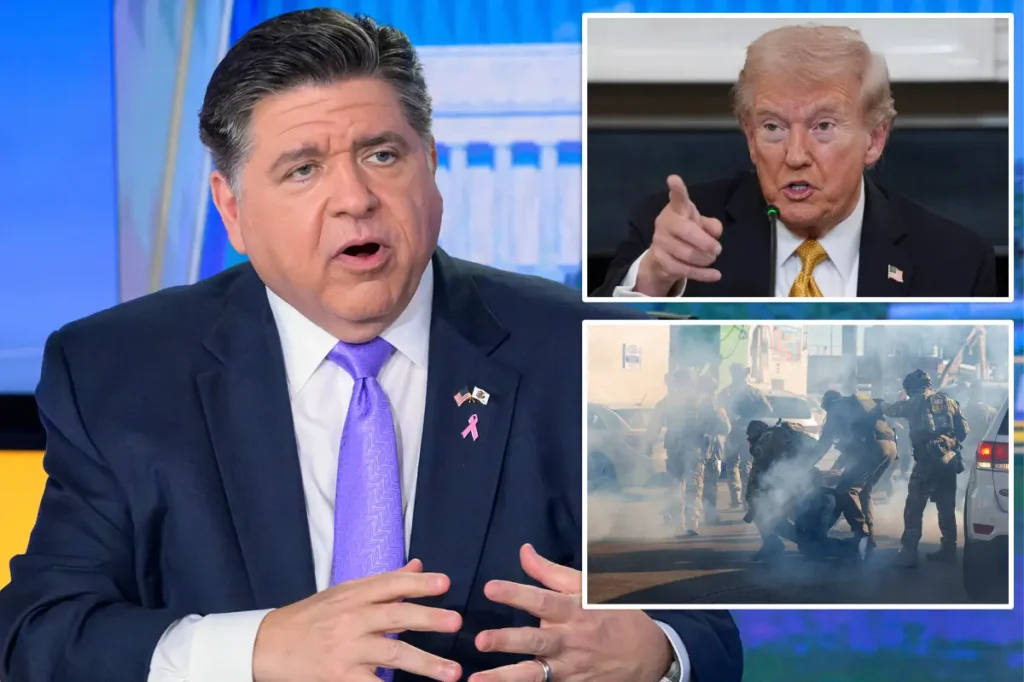Governor Pritzker Challenges Trump Administration’s Immigration Enforcement Tactics
In a pointed critique that has intensified the national debate on immigration enforcement, Illinois Democratic Governor JB Pritzker has publicly challenged President Donald Trump’s claims regarding Immigration and Customs Enforcement (ICE) operations in his state. During an appearance on “Special Report,” Governor Pritzker dismissed the President’s assertion that ICE agents are targeting “the worst of the worst,” instead characterizing the enforcement actions as racially motivated. “They’re literally going after black and brown people because of the color of their skin,” Pritzker stated unequivocally, highlighting his establishment of the Illinois Accountability Commission specifically designed to monitor ICE agents’ conduct. This confrontation represents just the latest chapter in an ongoing tension between state leadership and federal immigration policies, with Pritzker making no secret of his opposition to what he perceives as discriminatory enforcement practices.
The governor has drawn sharp parallels between current immigration enforcement tactics and dark historical precedents, going so far as to compare aspects of the administration’s approach to early authoritarian regimes. “I’m talking about what they were doing, taking away people’s rights, arresting people, asking them for papers,” Pritzker explained, adding that “Early on in an authoritarian regime, wherever it is in the world throughout history, this is what happens. It’s the beginning of something very bad for a country, especially a constitutional republic.” When pressed by host Bret Baier about whether such characterizations unfairly malign all ICE agents, Pritzker maintained his position, arguing that his criticism targets only inappropriate behavior rather than the entire agency. However, he expressed frustration at what he sees as a lack of accountability for misconduct, claiming there “literally haven’t been any suspensions or firings for the terrible things that they’ve done, literally grabbing people, tackling them when they’re US citizens and have done zero wrong.”
While acknowledging areas of agreement with federal priorities regarding violent criminals, Pritzker emphasized that Illinois remains committed to supporting law enforcement operations conducted with proper judicial warrants. “We want the bad guys off the streets,” he affirmed, drawing a distinction between legitimate enforcement and what he characterized as racial profiling. This nuanced position reflects the complex balancing act many state leaders face in navigating cooperation with federal authorities while protecting civil liberties. The governor’s establishment of the Accountability Commission signals his intent to maintain oversight of federal operations within Illinois borders, potentially creating additional friction points between state and federal jurisdictions as immigration enforcement continues to evolve under the current administration. Throughout the interview, Pritzker consistently returned to themes of constitutional rights and due process, positioning his administration as a bulwark against perceived federal overreach.
Beyond immediate immigration concerns, Governor Pritzker expressed deeper anxieties about democratic institutions, drawing connections between current federal actions and potential future threats to electoral integrity. Referring to discussions that allegedly occurred after the 2020 election, Pritzker referenced reports that former National Security Advisor Michael Flynn had publicly discussed using troops to seize ballot boxes. “You don’t think Donald Trump heard that and thought maybe that’s a good idea?” the governor asked rhetorically, suggesting that the deployment of federal agents to Democratic-led cities was motivated by political considerations rather than public safety concerns. This perspective frames current immigration enforcement as part of a larger pattern that Pritzker finds troubling for democratic governance, elevating what might otherwise be viewed as policy disagreements to questions about fundamental constitutional principles. The governor’s willingness to publicly voice these concerns underscores the heightened political tensions surrounding immigration policy in the current climate.
When challenged to identify positive accomplishments from the Trump administration, Pritzker did acknowledge that illegal border crossings no longer represent the same scale of “problem” as previously. However, he quickly pivoted to criticize what he sees as the administration’s failure to pursue comprehensive immigration reform through congressional channels. “Why does he want to send troops in? Why does he want to send ICE and CBP in? Why not get immigration reform in place that we can all rally around?” the governor questioned, highlighting that it has been four decades since both parties successfully collaborated on major immigration legislation. This observation speaks to a broader political reality that transcends the current administration—immigration reform has proven persistently elusive despite periodic bipartisan recognition of its necessity. Pritzker’s call to “finally do it” suggests frustration with short-term enforcement actions that fail to address systemic issues in America’s immigration framework.
The immediate practical impact of this philosophical clash between state and federal authorities is evident in ongoing legal battles over the deployment of National Guard troops to Illinois. A federal district court judge has issued a restraining order blocking such deployment, and the Trump administration has proposed extending this order while the Supreme Court considers the case following an emergency appeal. The high-stakes legal confrontation exemplifies how immigration enforcement has become a central battleground in broader questions about federalism, state rights, and executive authority. With no clear timeline for when the Supreme Court might rule on this specific case, the uncertainty creates practical challenges for both federal enforcement strategies and state governance plans. Meanwhile, communities caught in the middle of these disputes face continued uncertainty about enforcement practices and priorities, highlighting the human dimension of these legal and political disputes. As both sides await judicial resolution, the rhetorical confrontation between Governor Pritzker and the Trump administration illustrates the deeply entrenched positions that make immigration not just a policy disagreement but a fundamental conflict about American values and constitutional interpretation.


